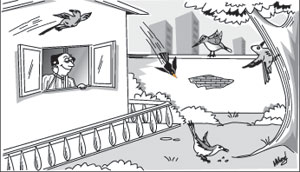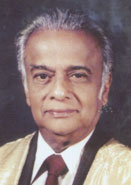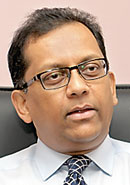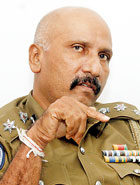Letters to the Editor
View(s):Is this what the Hippocratic oath is all about?
A recent ordeal when I took my 16-month-old daughter for medical care, after a horrifying accident, gave me a reality check to the decline in the quality of the health care services in Sri Lanka.
Holidaying in Nuwara Eliya, I fell on the doorstep of the bungalow, while carrying my daughter on June 11, resulting in her head hitting the cold stone floor with severe impact. After briefly attempting to calm her down, my husband and I found a tennis ball sized lump on her head.
Holding some ice cubes to the affected area, imagining the worst, my husband and I rushed her to the Nuwara Eliya General Hospital. When we reached there around 11.30 a.m., seeing our distraught plight, the heart-wrenching cries of the baby and my own tears and the vomit-splattered clothes, not only did the security guard allow us to drive into the hospital’s car park but many hospital staff ran with us, guiding us to the admitting Medical Officer.
As we rushed in, a nurse cleared the patient’s chair adjacent to the doctor’s chair and as I sat, the doctor sternly asked me whether the baby passed out or vomited on our way to the hospital. When my husband said no and explained that the baby vomited on the trip only after crying violently and coughing, he then asked me rudely, “Then why are you crying? Go to a corner and stop”. He stood up, without so much as a look at the baby and marched off to another patient.
Being the daughter of two senior doctors with 31 years of service — my mother is a deputy director of a leading General Hospital and my father a senior Consultant Anaesthetist in charge of the ICU of the same hospital — I was astonished at how cold and rude the doctor was.
Attendants and nurses were in sympathy with us and a kindly nurse asked me to calm down and try to rock my baby to calm her as well. My husband and I were shocked by the no-care attitude of the Medical Officer who did not deem it fit to examine the baby, but walked away, dismissing this case as not being urgent.
When he came back after awhile and heard my husband angered by his negligence and inattentiveness suggesting that we leave to a private hospital, the Medical Officer sternly asked him, “What did you say?” My husband then asked him, “Is this the way you treat your patients? We come rushing here in dire need of medical attention for our infant and you just dilly-dally playing with the health of our precious child”, the doctor responded very heatedly.
Then I stood up and asked him, “Do you know I am the daughter of so and so and is this how you treat patients who come in an emergency to you?” When he realized I was connected, he was embarrassed, although he said falteringly, “I don’t care who’s who you are”.
Our primary concern being the well-being of our baby, we walked out. The doctor then sent attendants after us, telling us to come back, but we rushed to our car and went in search of a private hospital. I am concerned that I needed to mention my family links in the healthcare sector to get my injured baby noticed.
After showing our baby to a doctor at a private hospital, where the doctor immediately took us in regardless of the patient he was seeing, we were on our way back to the bungalow to pack up our belongings and leave for Kandy to be near a hospital better-equipped to deal with such a crisis, when we were stopped by the Traffic Police. Thinking we had been stopped because my husband had forgotten to wear his seat belt, he explained our plight, only to be told by the policeman who looked troubled, “I can’t let you go. This vehicle number has been submitted in a complaint to the police and even if I were to let you pass, you will be detained further on”.
Realizing this was a retaliation by the doctor, we drove along with the policeman, to the police station and explained our situation including the negligence at the hands of the doctor, evoking sympathy among the policemen, with several policewomen gently touching the baby’s head.
In the face of the injustice perpetrated by the doctor, firstly of not attending to our baby and then harassing us by complaining to the police, we took the matter up with the HQI. He immediately asked the officer at the hospital police post to come to the police station, when the doctor concerned refused to come. The hospital police post officer informed the HQI that the doctor had wanted us to be warned never to do such a thing again.
When my husband asked him whether he witnessed the incident, he said he hadn’t but the Medical Officer had told him.
The Nuwara Eliya Police were understanding and treated us with kindness and empathy, urging us to leave. They assured us that they would do the needful and warn the doctor.
This incident made me think about the plight of the poor people who have to go through the state health sector and what injustice they may have to bear in silence. This doctor played with the health of a baby.
At the same time, there are a large number of doctors who will forego their basic needs to save lives and luckily they outnumber the bad ones.
However, one negligent doctor can influence the perception about doctors. We will seek an inquiry and intend to write to the Health Ministry.
Ashwini Surage,�Via e-mail
Who says birdsongs are not for city dwellers?
Every morning I am woken up in the early hours by the raucous cries of the Koha. Romantics welcome and enjoy bird calls, but to me, at four in the morning, when it is still very dark, this continuous cacophony is truly a nuisance. These flyers that depend on foster parents to bring up their children make the biggest noise. Their screaming and screeching goes on unabated till the new day dawns.
Then, in total antithesis to the Koha, comes the black-and-white Magpie, or Polkichcha, Lanka’s best known crooner. His repertoire of tunes to his lady love is like balm to the ear after the Koha calls.

With the arrival of the Magpie, the gates open and a host of other birds fly in to announce their presence: the gregarious, aptly named Babbler; the Tailors, the smallest bird with the biggest noise; Hummingbirds; Barbets, Kingfishers; Woodpeckers; Bulbuls, and Drongos.
Still later, one hears the unmistakable whistle of the Golden Oriole and, new arrivals, a pair of Ash Doves, with their nonstop cooing.
Still later comes a regular pair of Mynahs, picking their way over the lawn. You also hear the tuneless throaty cough of the Coucal as it goes about searching for snails.
At breakfast time, there is the usual flock of Parakeets that arrive and start evaluating a hole in a tree. None wants to occupy the hole for a nest, but the bargaining goes on for hours. This has been so for several months.
Seen but not heard are the occasional flyers, such as the Egrets, Herons and Green Bee-eaters.
Occasionally small flocks of Munias descend on the lawn. At least once a year, I witness the arrival of the Paradise Fly-Catcher, both white and red (Redi Hora and Gini Flora).
And through all this, from dawn to dusk, one hears the caw-caw of the ubiquitous Crow.
As the sun goes down and the moon rises in all its romantic glory, you hear the creatures of the night. Among these is the plaintive cry of a Lapwing, and a regular sitter on power lines, the Owl, hooting his presence.
I live half a mile east of the Dehiwala junction, still city and very urban. It is amazing that one can encounter such a dazzling array of bird life in these parts.
Mahendra Samarasinghe,�Dehiwala
Developers have wrecked Dehiwala�
Condominiums for the middle-class started becoming popular in this country mainly after the ’83 riots, when Tamils in the North wanted to get out of Jaffna.
By then the groundwork had already been done by far-sighted leaders like Ranasinghe Premadasa. Institutions such the National Housing Development Authority (NHDA), the Urban Development Authority (UDA), the Land Reclamation Authority, and so on, were set up to support the increasing demand for housing.
Initially, the demand was in areas such as Wellawatte, Kotahena, and Bambalapitiya. When land in those areas became pricey, developers started looking at Dehiwala, around the early ’90s. Since then, many housing complexes have come up. Roads that had just 40 to 50 separate houses saw that number go up several times with each new condo and its many housing units.
The boom meant that the infrastructure built for a limited number of housing units came under heavy strain, leading to regular breakdowns in water supply, drops in electricity voltage, parking, drainage and sewerage problems, etc.
The UDA imposed prudent conditions for condominium developers to abide by. But many UDA officials and local authorities ignored these rules, obviously after having received bribes. There were blatant violations of the building code. Permission to go up to a maximum six floors was routinely stretched to eight, 10 and 13 floors. Areas identified for parking were converted to other uses, causing problems for neighbourhood parking. Street and building lines were totally ignored. But surprisingly certificates of conformity (COCs) were granted!
In Dehiwala, roads have been damaged by vehicles transporting steel, rubble and concrete. Trenches have been dug to lay water. Sewerage connections remain unfilled. The developers refuse to patch up the damage they cause, saying the necessary money has been deposited with the Municipal Council.
I hope this letter catches the eye of Mr. Gotabaya Rajapaksa, Minister in-charge of the UDA, and the Mayor of the Dehiwala Municipal Council. The sooner the UDA and DMMC start getting their act together, the better for the rate payers of Dehiwala. We have been suffering for a long time as a result of undue favours extended to property developers.
Long-suffering Resident,�Dehiwala
Say no to Material Monks�
On the matter of Bhikkhus in business or politics, I would refer Parliamentarians, Buddhists and Bhikkhus to the very first sentence of the Third Sutta (“Dhammadaya Sutta’) in the Majjhima Nikaya, wherein the Buddha addresses the Bhikkhus thus.
“Bhikkhus, be my heirs in the Dhamma, not heirs in material things.”
P. de Fonseka,�Battaramulla
Neglected toilet block in Moneragala town�
The public toilet block adjoining the first bus halt on Pottuvil Road in Moneragala town has been neglected for a long time. This toilet facility is unusable. The rear boundary wall of the building has been pulled down, opening the way for encroachment.
The bus halt is very congested during peak hours. Private bus services to the hospital operate from this bus halt. Invalids and others keep a lookout for a place to relieve themselves. The local authority should renovate this toilet block as soon as possible for the benefit of the public, and to prevent encroachment.
D.M.R. Wijesekara,�Obbegoda, Moneragala
comments powered by Disqus


















